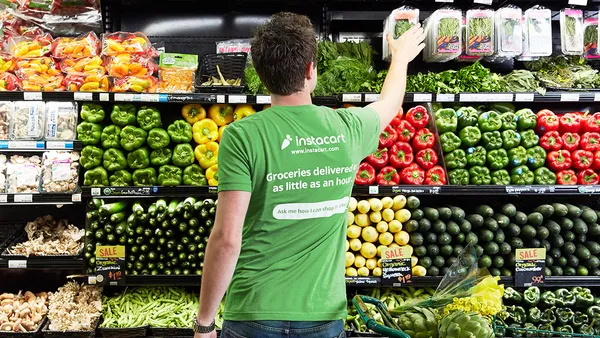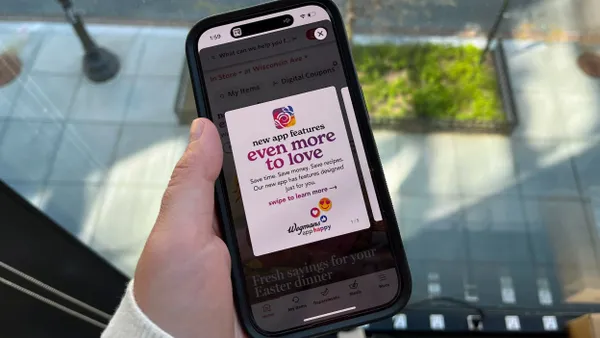Over the past two decades, supermarket retailers have differentiated themselves through value-added, personalized services that often focused on the healthful amenities consumers sought. For example, in-store dietitians, recipes, prominent nutritional data and meal-planning assistance were all designed to address vast special dietary needs.
While more than 90% of respondents to a study from the Food Marketing Institute said their store had an established health and wellness program, of the 94% of respondents who offered online shopping, only 70% offered similar health and wellness initiatives online. As e-commerce becomes an increasingly crucial channel, how can retailers replicate — and even improve —those personalized services in today's congested online grocery marketplace, where differentiation is critical to success?
The answer is data, says Rob Weisberg, senior vice president of e-commerce for Inmar Intelligence. "It gives you the ability to offer shoppers the personalized service they look for."
Nutritional Requirements Accelerate
A healthy lifestyle is paramount to today's consumers, who are increasingly implementing individualized eating plans such as low-sugar, low-sodium, low-carb and more. Specific eating protocols, such as vegan, paleo, gluten-free and keto diets, have grown threefold since 2018.
Navigating special dietary recommendations along with potential food allergies translates into a heavy lift for the online shopper, with 64% of those who have adopted online shopping saying they are highly focused on buying products for diets or other health-related programs for their household.
Today's retailers aim to boost customer affinity by offering a wide range of support for these complex shopping needs.This support includes serving up added value with nutritional information; product recommendations that meet customers' specific health, allergy and nutritional needs; and inspirational ideas and recipes to help create new meals incorporating nutritional constraints and preferences.
Marrying Online and Office Needs
Retailers must remember that busy consumers don't make a distinction between a retailer's in-store and digital brand but rather expect a seamless transition between the two.
"Retailers need to know their shopper wherever they're engaging with your brand, whether they're in the store or making a quick list from the sideline of their kid's soccer game," says Weisberg. "The 'holy grail' is to have a holistic view of your customer so you can understand and anticipate their shopping needs to proactively address them."
In the past, a customer might have entered a store and met with a nutritionist who toured them around to point out the location of preferred products. But then the next time, maybe the nutritionist was busy with another customer or didn't remember the specific needs.
That "institutional forgetfulness" can be a thing of the past as data steps in, Weisberg says. "When you can truly know your customer, it's like the shopper has a virtual dietitian on every trip — one who always remembers and has time for you."
Put Data on Your Shopping List
Grocers want to be able to provide tailored offers, product suggestions, recipes and information based on consumers' buying patterns — essentially a store or circular designed just for each shopper. And today they no longer have to rely on the hit-and-miss aspect of a one-size-fits-all environment, but can make solid recommendations based on household demographics and past buying behaviors across channels.
That's possible with Inmar, which at its core is a data company, says Weisberg. Initially integrated into POS systems to allow brands to peer into shoppers' physical baskets to understand their buying behaviors, that insight today is extended to digital channels, giving brands new abilities to connect the dots with one solution rather than piece together disparate tool sets and systems that don't communicate on the back end. Inmar can improve targeting and personalization, resulting in the right offer at the right time via the right channel.
"Now, it's like your customer is walking into a store where they are surrounded by options that have already been filtered to meet their needs, with recipes and meal-planning suggestions
added in along the way. We're giving the shopper the benefit of the combination of a virtual dietitian and a best friend," Weisberg says.
Not only does that create a more dedicated and loyal shopper, but it presents a more favorable return on media expenditures. "If you show a product with gluten to someone with celiac, it's a wasted impression. But with more accurate data, brands can stop throwing away marketing dollars on something a specific shopper will never consume," says Weisberg. For example, retailers can now customize a masthead to each shopper's specific behaviors, adding value for both the customer and the brand.
Inmar can extend this personalized approach to all media, so stores can send a circular that remembers and highlights a customer’s digital search or shows the keto-adopting shopper an appealing product as they check sports scores online.
"From the media to the circular to the site … data means that every touchpoint is oriented toward defining a customer's needs as an individual, remembering those insights and presenting the information in a scalable fashion that meets their complex preferences."










